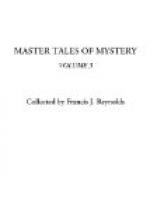“Two days before I hadn’t known of their existence. But I was there to see them off, and I was there when Scott came back.
“It was well on into the rainy season, and I was down with fever. I was in my house, in my hammock, and the wind was swinging it. It was probably the hammock that did all the swinging, but I thought it was the house, and I had one foot on the floor to try and steady it. But it was no use. The walls lifted and sank all in one rush, like the sides of a ship at sea. Outside I could see a pink roof, a white roof, a tin roof, and then the forest, with the opening of a path like the black mouth of a tunnel. I wanted to watch this tunnel, because I had an idea I’d seen something crawl along it a good while before. But I couldn’t manage it; I had to shut my eyes. And then I felt the scratching on my boot.
“I caught hold of the sides of the hammock, but it was some time before I could manage to pull myself up. Then I looked down.
“A man was lying on the floor, face down, just as he had crawled into my hut and fallen. The yellowish fingers of one hand clawed on my boot, and that was the only sign that he was alive. He lay quite still, except for the slow working of his fingers; and I sat still, also, staring down at him with the infinite leisure that follows a temperature of one hundred and five. It was only by slow degrees that I realized that this was Derek Scott come back, and that he was probably dying.
“I got to my feet and bent over him, but I wasn’t strong enough to raise him, of course. I was afraid he’d die before any one came. So I took my revolver and aimed as well as I could at that tin roof beneath which my man Pedro was eating his dinner. The barrel went up and down with the walls of the hut, but I must have hit the roof, for the next thing there was a lot of smoke and noise, and Pedro’s face, eyes, and mouth open, rushing out of it. There seemed no interval before I found myself sitting in the hammock and saying over and over again, ’But where’s the little chap? Where’s the little French chap?’
“Scott was still on the floor, but his head was on my man’s shoulder, and Pedro was gently feeding him with sips of brandy and condensed milk. He turned and looked at me, and his eyes were clear and considering as ever, though his answer didn’t sound quite sane. He said, ‘The clocks wouldn’t tick.’
“He said it as if it explained everything. Then he unstrapped a tin case from his belt, laid his head on it, and was instantly asleep.
“I cried out, ‘Is it the fever, Pedro?’ But my man said: ’No, Senor, it is the hunger.’ He rolled Scott up very cleverly in a blanket. ’This senor has had the fever, but it is not upon him now. Without doubt he is a little mad from being in the forest so long. But when he wakes he will be stronger.’ So much I heard, and no more. Unconsciousness came down on me like a wave. But into the dark heart of that wave I carried the certainty that Pedro knew all about the matter and that he hated Henkel. How or why I was certain of this I don’t know. But I was.




